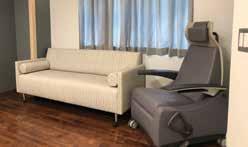
2 minute read
Expanding Critical Care Services, Close to Home
As a Level II Trauma Center and acute care referral center, Regional West Medical Center increasingly cares for many of the most critically ill and injured patients in the region. Critical care requires complex interventions and constant monitoring due to serious impairment of a patient’s vital organ systems.
With the evolution of healthcare over the past few decades — from lengthy stays in the past to outpatient treatment for a majority of health conditions and procedures — intensive care services are now in great demand. This evolution led Regional West to convert the second floor’s 2-East wing to the new 12-bed Critical Care Unit, expanding the Medical Center’s critical care capacity to 40.
Advertisement
“The demand for critical care services has grown nationwide. People are living longer with chronic illnesses, so when they are hospitalized they often require a higher intensity of care. In addition, we care for people of all ages who experience serious illnesses and injuries; and they, too, require critical care services,” says Tim Osterholm, MPA, Regional West executive vice president and chief operating officer. “It’s important to provide critical care close to home to allow patients’ families to be with them when they are seriously ill or injured.”
The new unit has 12 large, private rooms designed with the latest technology and a state-ofthe-art nurses’ station. Four rooms offer negative airflow capability for isolation of patients with potentially infectious diseases. Several rooms are designed for the care of bariatric patients.
Critical care is administered by skilled providers, including but not limited to neurosurgeons, pulmonologists, cardiologists, hospitalists, trauma surgeons, and more. The current Intensive Care and Progressive Care units, as well as the new unit, are staffed by skilled and experienced critical caretrained nurses and therapists.
Because the 2-East patient care unit was located directly above the Regional West cafeteria, the kitchen and cafeteria had to be closed for more than six months as demolition and construction proceeded. The Food & Nutrition Services department met the challenge of providing hot meals and nutritious food to patients by preparing them off-site in the kitchen of a local restaurant that was vacant.
Food & Nutrition Services Director Lori Miller and Assistant Director Jenny Larsen organized staff to transport meals to and from the hospital, secured local restaurants to provide mobile food trucks offering hot lunches on-site for staff and visitors, and set up a temporary Park Bench Express for food purchases.
The kitchen and cafeteria downtime provided an opportunity for structural repairs and updating of critical heating, electrical, and fire suppression systems to meet current building codes, as well as renewing the cafe with new flooring, paint, and other amenities.
“The completion of the new Critical Care Unit and renewal of the Park Bench Café mark additional milestones in our strategic plan to expand services, update our facility, and continue to provide exceptional care for regional residents,” says Regional West President and CEO John Mentgen.






